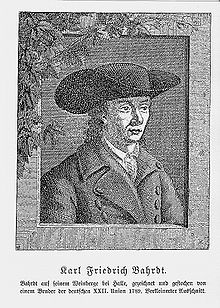The Religious Edict (play): Difference between revisions
No edit summary |
No edit summary |
||
| (2 intermediate revisions by 2 users not shown) | |||
| Line 1: | Line 1: | ||
====Date: [[:Category: | ====Date: [[:Category:1789|1789]]==== | ||
====Region: [[:Category:Europe|Europe]]==== | |||
====Subject: [[:Category:Religious|Religious]]==== | |||
====Medium: [[:Category:Theatre|Theatre]]==== | |||
====Medium: [[:Category:Theatre|Theatre | |||
---- | ---- | ||
[[File:Bahrdt.jpg|left]] | |||
'''Artist:''' Karl Friedrich Bahrdt (1741 - 1792) | |||
'''Confronting Bodies:''' Prussian authorities | |||
'''Confronting Bodies:''' | |||
'''Date of Action:''' 1789 | |||
'''Location:''' Prussia | |||
'''Description of Artwork:''' Bahrdt was known for advocating free expression as a fundamental right of men and challenging Christian dogma. <P> | '''Description of Artwork:''' Bahrdt was known for advocating free expression as a fundamental right of men and challenging Christian dogma. <P> | ||
'''The Incident:''' His treatise, ''On Freedom of the Press and its Limits'', describes freedom as the "jewel of all thinking beings and the nobility of mankind." He suggested that people must find religion for themselves through free thought and expression rather than blindly following their church leaders. Bahrdt wrote a play satirizing the German king called ''The Religious Edict''. The play challenged the suppression of speech and expression. Barhdt was imprisoned for the production of this play. <P> | |||
'''The Incident:''' His treatise, | |||
'''Results of Incident:''' Barhdt was released from prison after one year. It is believed that his release was granted by the king's chief minister so that Barhdt would not be viewed as a martyr. <P> | '''Results of Incident:''' Barhdt was released from prison after one year. It is believed that his release was granted by the king's chief minister so that Barhdt would not be viewed as a martyr. <P> | ||
'''Source:''' Censorship, A World Encyclopedia | '''Source:''' Censorship, A World Encyclopedia | ||
[[Category:1789]] | |||
[[Category:1780s]] | |||
[[Category: | [[Category:18th century]] | ||
[[Category:Europe]] | [[Category:Europe]] | ||
[[Category:Religious]] | [[Category:Religious]] | ||
[[Category:Theatre]] | [[Category:Theatre]] | ||
[[Category:Karl Friedrich Bahrdt]] | [[Category:Karl Friedrich Bahrdt]] | ||
{{DISPLAYTITLE:<span style="font-style: italic;">The Religious Edict</span> (play)}} | |||
{{DEFAULTSORT:Religious Edict, The (play)}} | |||
__NOTOC__ | __NOTOC__ | ||
Latest revision as of 02:11, 24 December 2011
Date: 1789
Region: Europe
Subject: Religious
Medium: Theatre
Artist: Karl Friedrich Bahrdt (1741 - 1792)
Confronting Bodies: Prussian authorities
Date of Action: 1789
Location: Prussia
Description of Artwork: Bahrdt was known for advocating free expression as a fundamental right of men and challenging Christian dogma.
The Incident: His treatise, On Freedom of the Press and its Limits, describes freedom as the "jewel of all thinking beings and the nobility of mankind." He suggested that people must find religion for themselves through free thought and expression rather than blindly following their church leaders. Bahrdt wrote a play satirizing the German king called The Religious Edict. The play challenged the suppression of speech and expression. Barhdt was imprisoned for the production of this play.
Results of Incident: Barhdt was released from prison after one year. It is believed that his release was granted by the king's chief minister so that Barhdt would not be viewed as a martyr.
Source: Censorship, A World Encyclopedia
